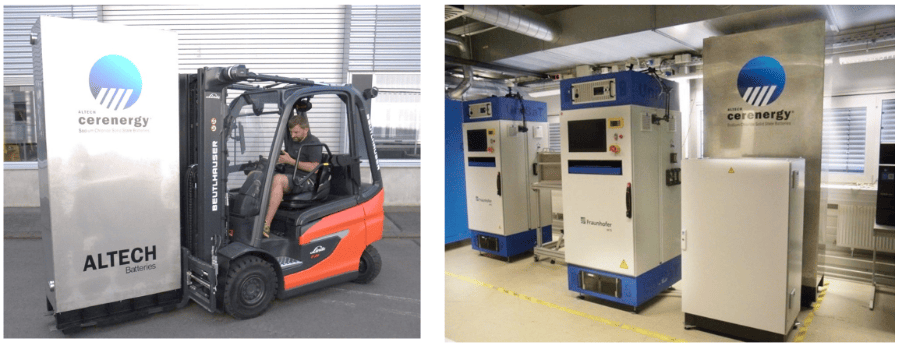Altech optimises design of sodium chloride batteries: a cheap, tough and safe alternative to lithium-ion
Tech
Tech
Altech Batteries has completed the optimised design of its 60KWh battery pack for the Definitive Feasibility Study (DFS) focused around commercialising the game-changing CERENERGY® batteries.
The company has a joint venture with world leading German battery institute Fraunhofer IKTS (Fraunhofer) to commercialise the revolutionary Sodium Chloride Solid State (SCSS) battery as an alternative to lithium-ion batteries.
The battery technology uses table salt and is lithium-free; cobalt-free; graphite-free; and copper-free, eliminating exposure to critical metal price rises and supply chain concerns.
Plus, the CERENERGY® batteries are fire and explosion- proof; have a life span of more than 15 years and operate in extreme cold and desert climates.
The ultimate goal is to construct a 100MWh production facility on Altech Batteries’ (ASX:ATC) land in Saxony, Germany to produce CERENERGY® battery modules to provide grid storage solutions to the market – with the permitting and licensing currently underway.

The 60KWh battery pack design has undergone a makeover, now sporting a sleek stainless-steel exterior which the company believes will have a better ability to endure extreme temperature variations, be it in snowy or desert conditions, while maintaining its pristine appearance.
The battery’s casing is equipped with a vacuum-sealed, double-sided enclosure that provides optimal insulation.
It is crucial to minimise heat transfer losses and ensure the safety of human contact with the battery’s exterior because it operates at around 270 degrees Celsius internally.
“We are extremely pleased with the new stainless-steel design of the 60 KWh batteries,” group MD Iggy Tan said.
“These will be able to operate in the snow, as well as desert conditions, without the finish being affected.
“The vacuum-sealed casing will provide the perfect insulation and minimise any heat loss, which is the key benefit of our sodium chloride solid-state batteries.”
Other optimisations include the base of the battery being reinforced to accommodate high-temperature-resistant electrical cables and connectors, minimising heat loss to the outside environment.
To counter the issue of cold starting, heating pads have been integrated into the internal vacuum-packed casing, however once activated the battery can efficiently sustain its internal temperature with minimal reliance on the heating pads.
In addition, further enhancements have been made to the five internal frames each housing 48 cells, optimising their performance.
Two working prototype ABS60 KWh batteries are currently in production from Fraunhofer, with roughly half of the required cells completed.
“The production of the prototype batteries is progressing well,” Tan said.
“The produced cells are performing well under bench performance testing and it will be great to see the whole 60KWh unit under performance load.
“This is the first time our partner Fraunhofer has made such a large battery unit.”
Whilst the cells are being fabricated, the first stainless-steel vacuum-sealed battery case has been delivered to the Fraunhofer Institute in Dresden where, prior to assembly of the battery cells, the battery casing will undergo comprehensive heat transfer loss testing as well as temperature profiling.
The cells will then be assembled in the pack once they are completed, and further cycling and long-term performance tests will be conducted on the battery packs.
This article was developed in collaboration with Altech Batteries, a Stockhead advertiser at the time of publishing.
This article does not constitute financial product advice. You should consider obtaining independent advice before making any financial decisions.